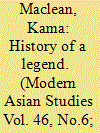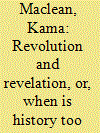| Srl | Item |
| 1 |
ID:
115286


|
|
|
|
|
| Publication |
2012.
|
| Summary/Abstract |
Narratives about the revolutionary movement have largely been the preserve of the popular domain in India, as Christopher Pinney has recently pointed out. India's best-known revolutionary, Bhagat Singh-who was executed by the British in 1931 for his role in the Lahore Conspiracy Case-has been celebrated more in posters, colourful bazaar histories and comic books than in academic tomes. These popular formats have established a hegemonic narrative of his life that has proved to be resistant to subsequent interventions as new materials, such as freshly-declassified intelligence reports and oral history testimonies, come to light. This paper accounts for why Bhagat Singh's life story has predominantly prevailed in the domain of the popular, with special reference to the secrecy of the revolutionary movement and the censure and censorship to which it was subjected in the 1930s.
|
|
|
|
|
|
|
|
|
|
|
|
|
|
|
|
| 2 |
ID:
147208


|
|
|
|
|
| Summary/Abstract |
If historiography is ordered by a series of thematic and methodological turns, then it is not hard to demonstrate that there has in recent years been a turn towards revolutionary histories of South Asia. Scholars have begun to transcend the limitations of Gandhian frameworks in search of more dynamic understandings of Indian pasts that factor in the role of violence, subterfuge and conspiracy in South Asian anti-colonial struggles. But what happens when new methodologies and narratives begin to destabilise or even invert longstanding historical readings that have been the basis for generations of academic knowledge of the past? When, and under what political and institutional conditions, are fresh interpretations of history sayable? Can historical trajectories or interpretations be quickly turned or must they evolve slowly? This paper is a self-reflexive critique of the ways in which radical histories can—or cannot—be written in the post-colonial moment, with reference to the compulsions brought to bear in the writing of revolutionary history. This article considers these historiographical issues alongside compelling evidence of the involvement of Jawaharlal and Motilal Nehru in key aspects of the revolutionary actions of the Hindustan Socialist Republican Association.
|
|
|
|
|
|
|
|
|
|
|
|
|
|
|
|